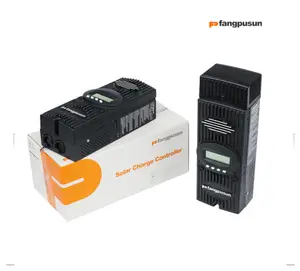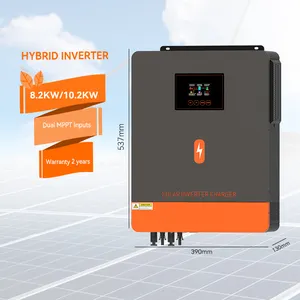

Mppt Fangpusun Flexmax 80 Flexmax 80a Mppt Solar Charge Controller 60a

Mppt 10KW Intelligent Parallel Solar Inverter Mppt Control Power Factory 1 High Frequency With Compact Design
















Maximum Power Point Tracking, commonly known as MPPT, is an advanced charging technology that optimizes the connection between solar panels and batteries. This electronic system maximizes the efficiency of the solar energy system by ensuring that the panels operate at their optimum power output. The MPPT solar charge controller is a pivotal component in photovoltaic systems, designed to extract the maximum possible power from solar panels.
The market offers various types of MPPT controllers, including the Victron MPPT, known for its reliability and efficiency. The Victron Energy MPPT series, such as the Victron MPPT 75 15 and Victron MPPT 100 30, cater to different voltage and current requirements, ensuring compatibility with a wide range of solar applications. The Smartsolar range, another subset of Victron, integrates smart technology for monitoring and control.
MPPT technology is versatile, suitable for various applications from small-scale residential solar systems to large-scale commercial power stations. The MPPT solar controllers are integral in systems that require efficiency and durability, such as remote telecommunications, RVs, and marine vehicles. The adaptability of the MPPT controller to varying weather conditions and solar intensities makes it a preferred choice for diverse applications.
An MPPT charge controller offers several features that enhance the performance of solar power systems. It adjusts its input to capture the maximum power from the solar panels and converts it to suit the battery's voltage. This process significantly increases the efficiency of the energy transfer, leading to faster charging times and prolonged battery life. The MPPT regulator also provides protection against overcharging, deep discharge, and electrical overload, ensuring the longevity of the system components.
The construction of MPPT devices like the Victron charge controller involves high-quality electronic components that ensure stability and durability. The robust build is designed to withstand environmental stress, maintaining performance over a wide range of temperatures and conditions. The materials used in MPPT controllers are chosen for their conductive properties and resistance to corrosion, which is crucial for outdoor applications.
Selecting the appropriate MPPT controller, such as the Victron Energy MPPT 100 30 or the 100 30 Victron, depends on the specific requirements of the solar installation. Factors to consider include the voltage and current output of the solar panels, the capacity of the batteries, and the environmental conditions of the installation site. It is essential to match the controller to the system's specifications to ensure optimal performance and efficiency.